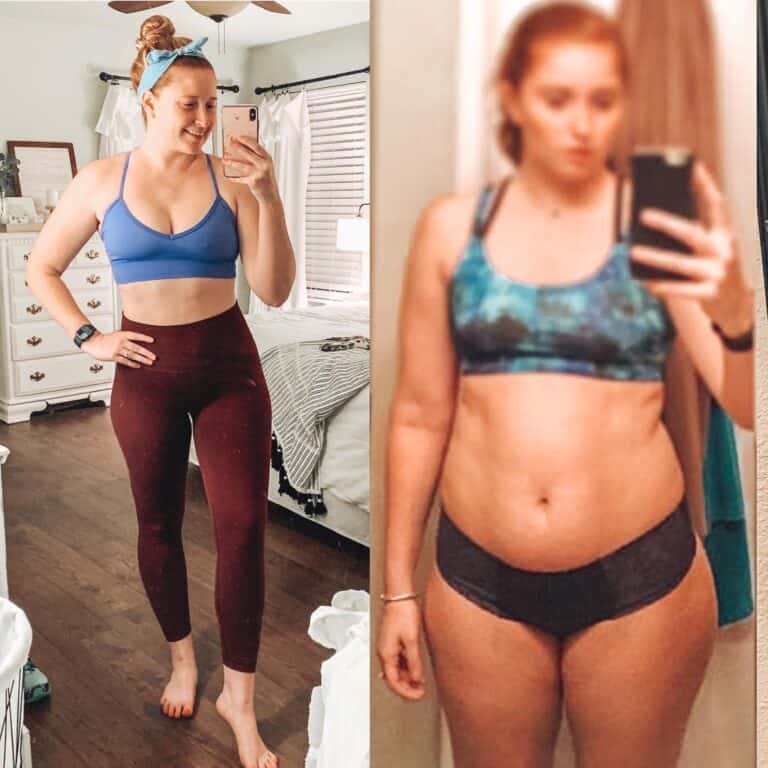How to Lose Weight Fast The Ultimate Guide Revealed!
Losing weight can be a challenging journey, but with the right approach and mindset, it becomes an attainable goal. This article is designed to provide you with the knowledge and tools you need to kickstart your weight loss journey and achieve rapid fat loss.
We will cover various aspects such as understanding the basics of weight loss, setting realistic goals, developing a balanced diet, incorporating regular exercise, managing stress and emotional eating, getting sufficient sleep, tracking progress, seeking support and accountability, overcoming plateaus, and maintaining weight loss in the long run.

Understanding the Basics of Weight Loss
Before diving into the strategies, it’s essential to grasp the fundamental concepts of weight loss. The first concept is “calories in vs. calories out.” To lose weight, you need to consume fewer calories than your body burns. This creates a calorie deficit, prompting your body to utilize stored fat for energy.
Another crucial aspect is metabolism. Your metabolism determines how efficiently your body burns calories. While genetics play a role, certain factors such as muscle mass and physical activity can influence your metabolic rate.
Creating a calorie deficit can be achieved through a combination of reducing calorie intake through diet and increasing calorie expenditure through exercise. By understanding these basics, you can strategically plan your weight loss journey.
Setting Realistic Goals
Setting realistic goals is a fundamental step in any successful weight loss journey. By establishing clear and achievable objectives, you can stay focused, motivated, and track your progress effectively. One effective framework for setting goals is the SMART goal framework, which stands for Specific, Measurable, Attainable, Relevant, and Time-bound.
Specific: When setting goals, it’s important to be specific about what you want to achieve. Instead of a vague goal like “I want to lose weight,” make it specific by stating “I want to lose 20 pounds.”
Measurable: Goals should be measurable so that you can track your progress and celebrate milestones along the way. For example, you can set a goal to lose 2 pounds per week or to exercise for 30 minutes a day, five days a week.
Attainable: It’s crucial to set goals that are realistic and attainable for you. Consider your current lifestyle, commitments, and capabilities. While it’s good to challenge yourself, setting unrealistic goals may lead to frustration and disappointment. Set goals that are within your reach and can be achieved with effort and commitment.
Relevant: Your goals should be relevant to your overall vision and weight loss objectives. They should align with your personal values and aspirations. For instance, if your aim is to improve your cardiovascular health, setting a goal to complete a 5K run would be relevant.
Time-bound: Goals need to have a deadline or timeframe to create a sense of urgency and prevent procrastination. By setting a specific time frame, you create a sense of accountability and motivation. For example, you can set a goal to lose 10 pounds in three months.
When setting goals, it’s important to consider both short-term and long-term objectives. Short-term goals can provide immediate motivation and a sense of achievement, while long-term goals keep you focused on your ultimate vision. Breaking down your long-term goals into smaller, actionable steps can make them more manageable and attainable.
Remember, setting realistic goals is not about aiming for perfection or comparing yourself to others. It’s about personal progress, self-improvement, and embracing a healthier lifestyle. Celebrate each milestone you reach along the way, as every small step contributes to your overall success.
By setting SMART goals, you create a roadmap for your weight loss journey, provide structure and motivation, and increase your chances of long-term success. So take the time to define your goals, write them down, and commit to achieving them. With determination and perseverance, you can make significant progress towards your dream body and a healthier, happier you.
Developing a Balanced and Nutritious Diet
When it comes to achieving weight loss goals, developing a balanced and nutritious diet is crucial. Your food choices play a significant role in fueling your body, supporting overall health, and facilitating weight loss. Here are some key points to consider when creating a balanced and nutritious diet:
Focus on Whole Foods: Whole foods are minimally processed and provide a wide range of essential nutrients. Incorporate plenty of fruits, vegetables, whole grains, lean proteins, and healthy fats into your meals. These foods are packed with vitamins, minerals, fiber, and antioxidants, which promote optimal health and support weight loss.
Choose Nutrient-Dense Options: Opt for foods that offer high nutritional value relative to their calorie content. Nutrient-dense foods include leafy greens, colorful vegetables, lean proteins such as chicken, fish, and legumes, whole grains like quinoa and brown rice, and healthy fats found in avocados, nuts, and seeds. These choices provide essential nutrients while helping you feel satisfied and energized.
Manage Macronutrients: Macronutrients, including carbohydrates, proteins, and fats, are essential for various bodily functions. Strive for a balanced intake of these macronutrients to support weight loss. Focus on complex carbohydrates such as whole grains, fruits, and vegetables, which provide sustained energy. Include lean sources of protein like poultry, fish, tofu, or legumes to support muscle growth and repair. Incorporate healthy fats from sources like avocados, nuts, seeds, and olive oil, which are important for satiety and nutrient absorption.
Practice Portion Control: Portion control is vital for weight loss. Be mindful of your portion sizes and avoid overeating. Listen to your body’s hunger and fullness cues, and aim to eat until you’re satisfied, not overly stuffed. Using smaller plates, measuring serving sizes, and practicing mindful eating can help you develop a better understanding of appropriate portion sizes.
Limit Processed Foods and Added Sugars: Processed foods are often high in added sugars, unhealthy fats, and empty calories. Minimize your consumption of sugary snacks, sodas, fast food, and highly processed snacks. Instead, opt for whole, unprocessed foods whenever possible. Be mindful of hidden sugars in condiments, sauces, and packaged foods, as these can contribute to excess calorie intake.
Stay Hydrated: Hydration is essential for overall health and weight loss. Water supports digestion, metabolism, and appetite control. Aim to drink an adequate amount of water throughout the day. Carry a reusable water bottle with you and set reminders if needed. Choose water over sugary drinks to avoid unnecessary calorie intake.
Individualize Your Diet: Everyone’s dietary needs and preferences are unique. Consider consulting a registered dietitian or nutritionist to tailor a diet plan that aligns with your specific requirements, food preferences, and health goals. They can provide personalized guidance and support, taking into account factors such as food allergies, medical conditions, and cultural considerations.
Remember, sustainable weight loss is not about restrictive diets or deprivation. It’s about adopting a balanced and nutritious approach to eating that nourishes your body and supports your weight loss goals. Focus on making healthy choices consistently, practicing portion control, and listening to your body’s needs. By prioritizing a balanced and nutritious diet, you can fuel your body optimally and enhance your weight loss journey.
Incorporating Regular Exercise
Incorporating regular exercise into your weight loss journey is crucial for achieving optimal results and maintaining a healthy lifestyle. Exercise not only helps burn calories but also offers numerous benefits for your cardiovascular health, muscle strength, and overall well-being. Here are some key points to consider when incorporating exercise into your routine:
Choose Activities You Enjoy: Engaging in exercises that you enjoy increases the likelihood of sticking to your routine. Whether it’s running, swimming, dancing, cycling, or playing a sport, find activities that you find enjoyable and incorporate them into your fitness plan. This way, you’ll stay motivated and look forward to each workout session.
Align with Your Fitness Level and Goals: Consider your current fitness level and goals when selecting exercises. If you’re a beginner, start with low-impact activities like walking or swimming and gradually increase intensity and duration. If you’re more experienced, challenge yourself with higher-intensity workouts or explore new fitness classes. Aligning your exercises with your goals ensures that you’re working towards achieving specific outcomes.
Include Cardiovascular Exercises: Cardiovascular exercises, also known as aerobic exercises, elevate your heart rate and help burn calories. They improve cardiovascular health, increase endurance, and contribute to weight loss. Activities like brisk walking, jogging, cycling, swimming, or aerobic classes are excellent choices. Aim for at least 150 minutes of moderate-intensity aerobic activity or 75 minutes of vigorous-intensity aerobic activity per week.
Incorporate Strength Training: Strength training is essential for building and maintaining muscle mass, which can enhance your metabolism and help with weight loss. Include exercises that target major muscle groups, such as squats, lunges, push-ups, and weightlifting. Aim for two or more days of strength training per week. Start with lighter weights or bodyweight exercises and gradually increase resistance as you progress.
Don’t Forget Flexibility and Balance: Flexibility exercises improve joint mobility, reduce the risk of injury, and help maintain proper posture. Incorporate activities like stretching, yoga, or Pilates into your routine to enhance flexibility and balance. These exercises can also promote relaxation and stress reduction.
Prioritize Consistency: Consistency is key when it comes to exercise. Aim for regular workouts and establish a routine that fits your schedule. Consistency allows your body to adapt and reap the benefits of exercise over time. Consider scheduling your workouts, finding an exercise buddy for accountability, or joining fitness classes to stay motivated.
Listen to Your Body: Pay attention to your body’s cues and respect its limits. Start slowly, gradually increasing intensity and duration. If you experience pain or discomfort, modify exercises or consult with Dr. Nancie and Dr. Alphonso. Taking care of your body and avoiding overexertion or injury is crucial for long-term success.
Combine Variety and Progression: Keep your workouts interesting by incorporating variety. Explore different types of exercises, try new fitness classes, or switch up your routine regularly. Additionally, focus on progression by gradually increasing the intensity, duration, or resistance of your exercises over time. Progression helps challenge your body and ensures continued improvement.
Remember, exercise is not solely about weight loss. It’s about improving your overall health, boosting energy levels, reducing stress, and enhancing your well-being. Find activities that you enjoy and that bring you joy, and make exercise a consistent part of your lifestyle. With dedication and persistence, regular exercise will complement your balanced diet and contribute to your weight loss journey.
Hydration and its Impact on Weight Loss
Hydration is a key factor in achieving successful weight loss and maintaining overall health. Water is essential for various bodily functions and has a direct impact on your metabolism, digestion, and appetite control. Here are some important points to consider regarding hydration and its impact on weight loss:
Boosts Metabolism: Staying properly hydrated can boost your metabolism, which is the process by which your body converts food and drinks into energy. Studies have shown that drinking water can temporarily increase your resting metabolic rate, allowing your body to burn more calories throughout the day. By keeping your metabolism active, adequate hydration can support weight loss efforts.
Aids Digestion: Water plays a vital role in digestion by helping to break down food, absorb nutrients, and eliminate waste. Drinking enough water can prevent constipation and promote regular bowel movements, ensuring that your digestive system functions optimally. Adequate hydration can also help alleviate digestive issues and reduce bloating, making you feel more comfortable and facilitating weight loss.
Controls Appetite: Dehydration can sometimes be mistaken for hunger, leading to unnecessary calorie consumption. By staying hydrated, you can help distinguish between true hunger and thirst, reducing the likelihood of overeating. Drinking water before meals can also create a feeling of fullness, which can help control portion sizes and prevent overindulgence. By managing your appetite through proper hydration, you can support your weight loss goals.
Set a Hydration Goal: It’s important to aim for an adequate intake of water throughout the day. While individual needs may vary, a general guideline is to consume about 8 cups (64 ounces) of water per day. However, factors such as activity level, climate, and personal circumstances can affect your hydration requirements. Consider using a reusable water bottle to track your water intake and set reminders to ensure you stay hydrated consistently.
Choose Water Over Sugary Drinks: When hydrating, it’s crucial to choose water as your primary beverage. Sugary drinks such as soda, fruit juices, and sweetened beverages can contribute to excess calorie intake and hinder weight loss efforts. These beverages are often high in added sugars and offer little nutritional value. Opt for water as your go-to drink and flavor it naturally with fresh fruits or herbs if desired. Not only will you save calories, but you’ll also provide your body with the hydration it needs.
Listen to Your Body: Pay attention to your body’s thirst cues and drink water whenever you feel thirsty. Additionally, be mindful of hydration during physical activity, as you may need to increase your water intake to compensate for fluid loss through sweating. Monitor the color of your urine; if it’s pale yellow, you’re likely well-hydrated, but if it’s dark yellow, it’s an indication that you need to drink more water.
Incorporating adequate hydration into your weight loss journey is a simple yet powerful strategy. By prioritizing water intake, you can support your metabolism, improve digestion, manage appetite, and maintain overall health. Make hydration a habit by carrying a water bottle with you, setting reminders, and choosing water as your beverage of choice. With proper hydration, you’ll optimize your weight loss efforts and promote overall well-being.
Managing Stress and Emotional Eating
Managing stress and addressing emotional eating are essential components of a successful weight loss journey. Stress can contribute to weight gain or hinder weight loss progress due to its impact on hormones, cravings, and emotional well-being. Here are some key strategies for managing stress and overcoming emotional eating:
Understand the Connection: Recognize the relationship between stress and weight gain. When you’re stressed, your body releases cortisol, a hormone that can increase appetite, especially for sugary and fatty foods. Stress can also lead to emotional eating as a way to cope with negative emotions. Being aware of these connections is the first step in addressing them effectively.
Stress Management Techniques: Implement stress management techniques to reduce and cope with stress in a healthy manner. Engage in activities that promote relaxation, such as meditation, deep breathing exercises, or mindfulness practices. These techniques can help calm your mind, reduce anxiety, and restore emotional balance. Find what works best for you and make it a regular part of your routine.
Exercise as a Stress Reliever: Regular physical activity is not only beneficial for weight loss but also acts as a powerful stress reliever. Engaging in exercises you enjoy, such as walking, jogging, dancing, or practicing yoga, can help reduce stress levels, boost mood-enhancing endorphins, and promote overall well-being. Aim for at least 30 minutes of moderate-intensity exercise most days of the week.
Seek Emotional Support: Reach out to friends, family, or a support group when you’re feeling stressed or overwhelmed. Sharing your feelings and thoughts with others can provide a sense of relief and perspective. Additionally, having a support system can offer encouragement, accountability, and guidance during challenging times.
Practice Self-Care: Prioritize self-care activities to nurture your physical and emotional well-being. Take time for activities you enjoy, whether it’s reading a book, taking a bath, listening to music, or spending time in nature. Engaging in self-care promotes relaxation, self-compassion, and stress reduction, preventing emotional eating as a means of comfort.
Identify Triggers and Find Alternatives: Become aware of the triggers that lead to emotional eating, such as boredom, sadness, or anxiety. When faced with these triggers, find healthier alternatives to cope with emotions. Instead of reaching for food, engage in activities like journaling, listening to music, practicing a hobby, or going for a walk. Discover what brings you joy and fulfillment beyond food.
Mindful Eating: Practice mindful eating to develop a healthier relationship with food. Pay attention to physical hunger and fullness cues, eat slowly, and savor each bite. Focus on the taste, texture, and satisfaction that food brings. Mindful eating helps you become more attuned to your body’s needs and reduces the tendency to use food as an emotional crutch.
Professional Support: If you find it challenging to manage stress or overcome emotional eating on your own, consider seeking professional support. A therapist or counselor can provide guidance, tools, and strategies tailored to your specific needs. They can help you address underlying emotional issues and develop healthier coping mechanisms.
Remember, managing stress and emotional eating is a journey that requires patience and self-compassion. Be kind to yourself and embrace progress over perfection. By implementing stress management techniques, seeking support, practicing self-care, and being mindful of your eating habits, you can overcome emotional eating and create healthier ways to cope with stress.
Getting Sufficient Sleep
Getting sufficient sleep is a crucial yet often neglected aspect of a successful weight loss journey. Quality sleep is essential for overall health, well-being, and maintaining a healthy weight. Lack of sleep can disrupt hormone levels, leading to increased hunger, cravings, and a higher risk of weight gain. Here are some key points to consider regarding the importance of sufficient sleep for weight loss:
Hormonal Balance: Sleep plays a significant role in regulating hormones that control appetite, metabolism, and energy balance. Lack of sleep can disrupt the production of hormones such as leptin (which suppresses appetite) and ghrelin (which stimulates appetite), leading to an increased desire for high-calorie, sugary, and fatty foods. This hormonal imbalance can make it more challenging to stick to a healthy eating plan and contribute to weight gain.
Quality and Quantity: Both the quality and quantity of sleep are important. Aim for 7-9 hours of uninterrupted sleep each night. Establishing a consistent sleep routine, going to bed and waking up at the same time every day (even on weekends), can help regulate your body’s internal clock and promote better sleep quality.
Create a Sleep-Friendly Environment: Create a sleep-friendly environment that promotes relaxation and restful sleep. Keep your bedroom cool, dark, and quiet. Use comfortable bedding and invest in a supportive mattress and pillows. Minimize external disturbances, such as noise and light, using earplugs, curtains, or white noise machines.
Limit Electronic Device Usage: The blue light emitted by electronic devices such as smartphones, tablets, and computers can interfere with your sleep quality. Limit electronic device usage at least one hour before bed to allow your body to wind down. Engage in relaxing activities instead, such as reading a book, taking a warm bath, or practicing relaxation techniques.
Practice Relaxation Techniques: Incorporate relaxation techniques into your evening routine to prepare your body and mind for sleep. Techniques such as deep breathing exercises, meditation, gentle stretching, or listening to calming music can help relax your body and promote better sleep quality.
Manage Stress and Anxiety: Unresolved stress and anxiety can interfere with sleep quality. Find healthy ways to manage stress, such as engaging in regular exercise, practicing mindfulness, journaling, or seeking support from a therapist or counselor. By addressing and managing stress, you can create a more conducive environment for restful sleep.
Avoid Stimulants: Limit or avoid consuming stimulants such as caffeine and nicotine, especially close to bedtime. These substances can disrupt sleep patterns and make it harder to fall asleep or stay asleep. Instead, opt for herbal teas or decaffeinated beverages in the evening.
Prioritize Sleep in Your Routine: Make sleep a priority in your daily routine. Set aside enough time for adequate sleep, just as you would for other important tasks. By prioritizing sleep, you prioritize your overall health and well-being, which in turn supports your weight loss goals.
Getting sufficient, restful sleep is a powerful tool for weight loss and overall health. By prioritizing sleep, creating a sleep-friendly environment, managing stress, and adopting healthy sleep habits, you can improve your sleep quality and support your weight loss efforts. Remember, a well-rested body and mind are better equipped to make healthy choices and maintain a balanced lifestyle.
Tracking Progress and Making Adjustments
Tracking your progress and making adjustments are key components of a successful weight loss journey. By monitoring your food intake, exercise routine, and measurements, you can gain valuable insights into your habits and progress, identify areas for improvement, and make necessary adjustments to stay on track. Here’s why tracking progress and making adjustments are crucial and how you can implement them effectively:
Importance of Tracking: Tracking allows you to have a clear understanding of your daily habits and behaviors related to food and exercise. It provides valuable information about your calorie intake, nutrient composition, portion sizes, and the effectiveness of your workouts. By tracking your progress, you can objectively evaluate your efforts, identify patterns or areas that need improvement, and stay accountable to your goals.
Methods of Tracking: There are various methods to track your progress, depending on your preferences and lifestyle. You can use a journal or notebook to manually record your meals, exercise sessions, and measurements. Alternatively, you can utilize mobile apps or online tools that offer features such as calorie counters, food diaries, activity trackers, and progress charts. Choose a method that suits your needs and allows you to track consistently.
Food Tracking: Track your food intake by recording what you eat and drink throughout the day. Include portion sizes, ingredients, and cooking methods. This helps create awareness about your eating patterns, nutrient intake, and potential areas of overconsumption. You can track calories, macronutrients, and micronutrients to ensure you’re meeting your nutritional needs. Be honest and accurate in your tracking to gain a comprehensive picture of your dietary habits.
Exercise Tracking: Record your exercise sessions to monitor your physical activity levels and progress. Note the type of exercise, duration, intensity, and any specific details. Tracking exercise allows you to assess the effectiveness of your workouts, identify areas for improvement, and stay motivated. It also helps you ensure that you’re incorporating a balance of cardiovascular exercises, strength training, and flexibility exercises into your routine.
Measurement Tracking: In addition to tracking food and exercise, regularly measure your progress using various metrics. These can include body weight, body measurements (such as waist, hips, and thighs), body fat percentage, or clothing sizes. Taking measurements at consistent intervals, such as weekly or monthly, allows you to observe changes and trends over time. It’s important to remember that weight loss is not the only indicator of progress, as body composition and other factors play a role as well.
Review and Adjustments: Regularly review your tracking data and assess your progress. Analyze patterns, identify strengths and weaknesses, and determine areas where adjustments may be needed. For example, if you notice that your calorie intake is consistently exceeding your goals, you may need to make dietary adjustments such as portion control or reducing the consumption of certain foods. If you’re not seeing the desired results in your workouts, you might consider modifying your exercise routine or seeking guidance from a fitness professional.
Seeking Professional Guidance: If you’re unsure about how to make effective adjustments or encounter challenges in your weight loss journey, consider seeking guidance from Dr. Nancie and Dr. Alphonso, registered dietitian, or certified nutritionist. They can provide personalized advice based on your specific needs, goals, and health considerations. They can help you make appropriate adjustments to your nutrition and exercise plan, ensuring that you’re on the right track.
Remember, tracking progress and making adjustments are ongoing processes. Regularly reassess your goals, evaluate your progress, and make necessary modifications. Stay flexible and open to change as you discover what works best for your body and lifestyle. By tracking and adjusting, you can optimize your weight loss journey and ensure long-term success.
Seeking Support and Accountability
Seeking support and accountability is a powerful strategy that can greatly enhance your weight loss journey. Building a support system and finding an accountability partner can provide motivation, encouragement, and valuable insights. Here’s why seeking support and accountability is important and how you can incorporate it into your weight loss efforts:
Benefits of Support and Accountability:
- Motivation: Being part of a supportive community or having an accountability partner can provide the motivation you need to stay focused on your weight loss goals. Encouragement and support from others can boost your spirits, especially during challenging times.
- Emotional Support: Weight loss journeys can be emotionally challenging. Having a support system allows you to share your experiences, frustrations, and successes with people who understand and empathize with your journey. This emotional support can provide comfort, reassurance, and a sense of belonging.
- Knowledge and Insights: Engaging with like-minded individuals or joining weight loss communities exposes you to a wealth of knowledge and insights. You can learn from others’ experiences, gain new ideas for healthy recipes, discover effective workout routines, and access valuable resources. Sharing and learning from each other’s journeys can enrich your own weight loss process.
- Accountability: Accountability plays a vital role in staying committed to your goals. When you have someone to be accountable to, such as an accountability partner, you’re more likely to stay consistent, track your progress, and make healthier choices. The sense of responsibility to someone else can help you stay on track and overcome obstacles.
Finding Support and Accountability:
- Join Weight Loss Communities: Look for local or online weight loss communities, forums, or social media groups where you can connect with individuals who share similar goals. Engage in discussions, share your progress, seek advice, and offer support to others. This sense of community can provide a valuable source of encouragement and inspiration.
- Seek an Accountability Partner: Find a friend, family member, or colleague who is also on a weight loss journey or shares similar health goals. Make a commitment to support and hold each other accountable. Set regular check-ins, share your progress, and offer encouragement and guidance. Having a partner who understands your challenges and celebrates your successes can make a significant difference in staying on track.
- Use Mobile Apps or Online Tools: Utilize mobile apps or online platforms specifically designed for weight loss support and accountability. These tools often provide features such as progress tracking, meal planning, workout logs, and virtual communities. They can help you stay organized, connected, and motivated on your weight loss journey.
- Consider Professional Support: If you require specialized guidance, consider working with Dr. Nancie and Dr. Alphonso, registered dietitian, or certified personal trainer. They can provide personalized advice, create customized plans, and offer professional support tailored to your unique needs and circumstances.
Remember, seeking support and accountability is not a sign of weakness, but a recognition of the power of human connection and shared experiences. Surrounding yourself with a supportive network can provide the encouragement, knowledge, and accountability necessary to overcome challenges and achieve your weight loss goals. Embrace the journey together, celebrate each other’s successes, and offer a helping hand during difficult times. Together, you can create a supportive environment that fuels your motivation and propels you towards lasting success.
Overcoming Plateaus and Challenges
Weight loss plateaus and challenges are common but can be overcome with the right strategies. Plateaus occur when your body adjusts to your current routine, leading to a slowdown in weight loss. To break through plateaus, consider modifying your exercise routine, adjusting your calorie intake, or trying new activities to challenge your body.
When faced with setbacks and challenges, remember to stay positive and maintain a growth mindset. Reflect on what went wrong, learn from it, and adjust your approach accordingly. Seek support from your accountability partner or weight loss community to stay motivated and focused.
Maintaining Weight Loss and a Healthy Lifestyle
Achieving weight loss is only the beginning. To sustain your progress, focus on maintaining a healthy lifestyle. Incorporate the habits and strategies you’ve learned throughout your weight loss journey into your daily routine. Embrace a balanced diet, regular exercise, proper hydration, stress management techniques, and sufficient sleep as lifelong practices.
Celebrating Milestones and Non-Scale Victories
While scale victories are important, it’s equally crucial to celebrate non-scale victories. Recognize and acknowledge the achievements that go beyond the numbers on the scale. These can include improved energy levels, increased stamina, better sleep quality, clothing size changes, or positive changes in your mindset and self-confidence. Reward yourself for reaching milestones, whether it’s with a non-food-related treat, a pampering session, or a fun activity you enjoy.
Start Your Weight Loss Journey Today
Embarking on a weight loss journey can be challenging, but armed with the right strategies and mindset, you can achieve your goals. Remember that sustainable weight loss is a gradual process that requires patience, consistency, and dedication. Focus on making long-lasting lifestyle changes rather than seeking quick fixes.
By understanding the basics of weight loss, setting realistic goals, developing a balanced diet, incorporating regular exercise, managing stress, getting sufficient sleep, tracking progress, seeking support, overcoming plateaus, and maintaining a healthy lifestyle, you can transform your body and embrace a healthier, happier you.
Don’t miss out on the opportunity to take control of your weight and well-being. Start implementing these strategies today and unlock the path to your ideal weight.
FAQs (Frequently Asked Questions)
- How quickly can I expect to lose weight?
- Weight loss rates vary depending on individual factors such as metabolism, starting weight, and adherence to the program. Aim for a gradual and sustainable weight loss of 1-2 pounds per week.
- Can I still enjoy my favorite foods while losing weight?
- Yes! Incorporating your favorite foods in moderation is possible. The key is to practice portion control and make healthier choices overall.
- What should I do if I hit a weight loss plateau?
- Plateaus are common. Consider adjusting your exercise routine, reassessing your calorie intake, or seeking guidance from Dr. Nancie and Dr. Alphonso or nutritionist.
- Is it necessary to count calories?
- While calorie counting can be helpful for some individuals, it’s not necessary for everyone. Focus on overall healthy eating patterns and portion control.
- How do I stay motivated throughout my weight loss journey?
- Find your source of motivation, set achievable goals, celebrate milestones, and seek support from a community or accountability partner. Remember why you started and the positive impact on your health and well-being.
What To Do Next…
For people who want to stop struggling with their weight

We Now Have FDA Approved Semaglutide Weight Loss in Sarasota and Bradenton Florida. Book a free consultation and find out about the semaglutide cost and semaglutide side effects. Semaglutide injection are available after your free consultation.






